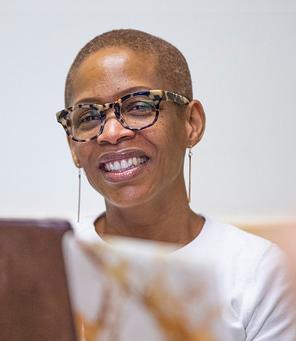Time Matters

Dawna Ballard
Department of Communication Studies
Associate Professor
In an era of deadlines compounded by information overload, Department of Communication Studies Associate Professor Dawna Ballard assesses the ways we’re changing as a society and as individuals, including such topics as work-life balance, attention management, multitasking and what drives our pace of life.
Challenging conventional notions of time, Ballard teaches students to rethink how we view chronemics—the study of the role of time in communication—as part of human interaction.
Since time is a measure of what we invest in an allotted period—and what activities one chooses to do—Ballard said Western post-industrialized time often exposes what is important to individuals and studies how we manage these demands. According to her research, the modern obsession with punctuality was facilitated by the refinement of the mechanical clock and its spread to the masses. The concept ensured the modern workforce would remain consistent at the dawn of the Industrial Revolution.
“The word ‘deadline’ originates from a line that bordered military prisons and if you crossed that line, you got shot.”
As modern-day Americans clutch their smartphones to text through the day, book a car ride or find love through dating apps, these technological advances presumably allow for more flexible schedules. To the contrary, Ballard argues that this multitasking leads some people to report feeling more pressured by the clock than ever before.
“The word ‘deadline’ originates from a line that bordered military prisons and if you crossed that line, you got shot,” said Ballard. “With the technological access now, we face more deadlines and feel this intense pressure of falling behind, but we need to keep perspective about what is really at stake.”
In Ballard’s graduate course “On Time,” students choose one of two options to think about time in a more constructive manner in an assignment titled “time sensitivity field work.” They include waiting in line at the famous Franklin Barbecue—where waiting is often seen as part of the experience and excuse to meet others—or a visit to the Blanton Museum of Art on campus to appreciate artist Ellsworth Kelley’s “Austin,” an edifice constructed as a site for contemplation and self-reflection. A third option to create a flash mob has only been selected once and was choreographed by the entire class in a previous semester.
In her undergraduate course “Time Matters,” Ballard provides strategies to realign well-being for those who may benefit from new approaches and solutions to everyday life or are often feeling “burnt out.” Some of the strategies she assigns her students include:
- Scheduled: reschedule an appointment or cancel one that you believe will alleviate the stress of someone else and yourself.
- Snail Mail: hand-write two letters with one authored to someone you see all the time and the second to someone you haven’t seen in a long time.
- Sleepless: Take seven days to commit to a full night’s rest and sleep by consistently going to bed early and often.
- Unplug: Take a day to not multitask in everything you do.
Ballard said among the goals of her course is to open students to the concept of mindfulness and being aware of present time.
“I want my students to be mindful that there’s no invisible force. So, time is a concept we all agree to accept, and we use clocks to coordinate it,” said Ballard. “That being said, showing up early to appointments is good for your health in that you’re not constantly at elevated levels of tension. Time management is, in a way, the replacement to the fight-or-flight response, and it’s up to us how we manage it.”
